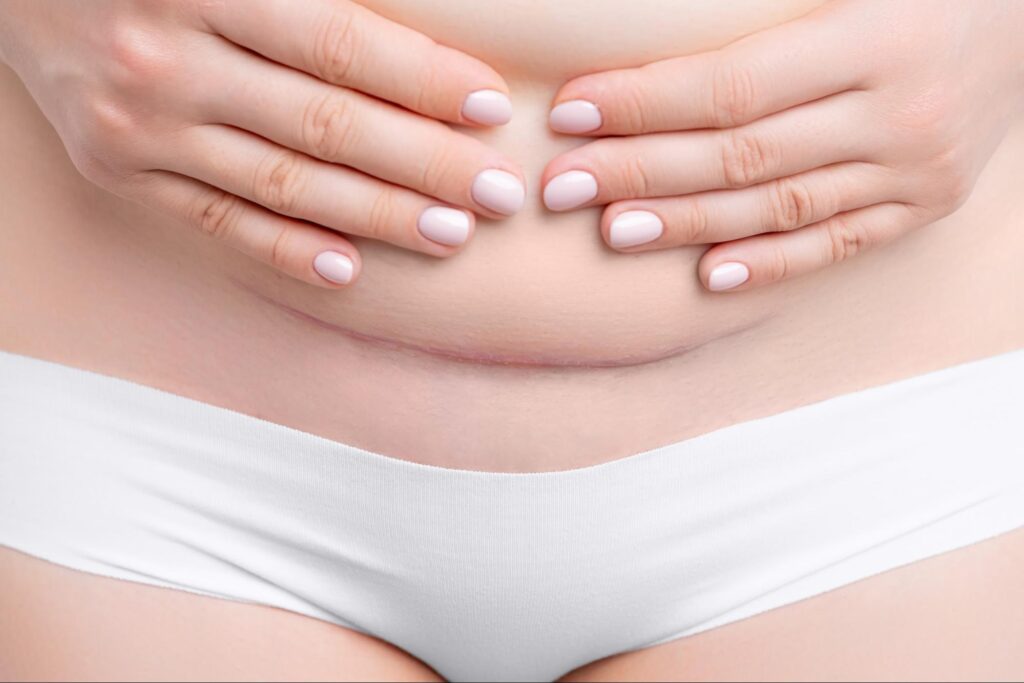This article discusses why a thoughtful postpartum recovery plan is crucial. Continue reading to learn more.
What Is a Postpartum Recovery Plan?
A postpartum recovery plan is a personalized roadmap designed to support you as you transition from pregnancy to parenthood. It outlines the steps and strategies for postpartum care, focusing on your immediate postpartum period and the weeks postpartum as your body heals.
For those who had a C-section, understanding your body’s healing process is especially important. For instance, tracking your c section postpartum belly week by week will help monitor your recovery. This is vital because, with a C-section, your incision site requires special care, and postpartum symptoms like abdominal pain or heavy vaginal bleeding should not be ignored.
A solid recovery plan should also address common postpartum concerns like perineal pain from a vaginal birth, diastasis recti, and body changes such as the gradual shedding of pregnancy weight. In addition, tools like a vaginal pH test can be useful for monitoring vaginal health during postpartum, as hormonal changes may affect the vaginal environment and increase the risk of infections.
Why You Need a Postpartum Recovery Plan
A comprehensive postpartum care plan is crucial for several reasons. First, it helps you focus on essential aspects of your recovery, such as rest, nutrition, and self-care. New parents often find themselves juggling a new routine while caring for a newborn, leading to exhaustion and sleep deprivation.

A recovery plan ensures you’re making time for both yourself and your baby during these early weeks postpartum.
Recovery Tips for New Moms
Every new mother’s postpartum recovery journey is unique, but several universal tips can help make the process smoother:
Rest
Rest is critical for healing, as it allows your body to regain strength from the physical strain it experienced during childbirth. While it can be challenging to get consistent sleep, try to rest whenever you can. It’s also best to get help with household chores or baby care. Remember, your postpartum recovery requires sufficient time for the body to restore its health and energy levels.
Nutrition
The quality of your nutrition is vital during the postpartum period. Proper nutrition supports your body’s healing process, boosts your milk supply if you’re breastfeeding, and helps energize the body after months of pregnancy and the birthing process. Focus on nutrient-rich foods like fruits, vegetables, lean proteins, and whole grains. Hydration is also vital, as drinking plenty of water can improve milk production and aid in overall recovery.
Exercise
Light activities like walking or practicing Kegel exercises can boost circulation, lower the chances of blood clots, and slowly rebuild pelvic floor strength. However, it’s important to avoid strenuous activities, especially if you’ve had a C-section or experienced significant physical symptoms like a perineal tear. Allowing the body to heal completely is still the top priority, so it’s best to wait for your healthcare provider’s approval before starting any postpartum fitness routine.
Self-care
Prioritizing self-care is crucial during the postpartum period, even when it feels like there’s little time for yourself. Small acts of self-care, such as taking a warm sitz bath to soothe perineal pain or using witch hazel pads to reduce swelling, can make a big difference. It’s also essential to take care of your emotional health by finding moments of relaxation, whether that means reading, listening to music, or practicing mindfulness. Self-care helps maintain both physical and emotional balance, which is essential for long-term recovery.
Monitor Symptoms
Pay attention to your body’s signals and track any postpartum symptoms like heavy vaginal bleeding, severe abdominal pain, or changes in mood.

If anything feels unusual or alarming, such as signs of postpartum hemorrhage or postpartum depression, don’t hesitate to seek medical attention. Also, continue to meet with your healthcare provider regularly to ensure that your recovery is progressing well.
Breastfeeding and Milk Supply
For new mothers who are breastfeeding, managing breast engorgement and sore nipples and maintaining milk supply are essential parts of the postpartum experience. Be patient with yourself during this adjustment, as breastfeeding can be challenging in the beginning. If you encounter difficulties, consulting a lactation specialist can provide guidance and support.
By incorporating these recovery tips into your postpartum care plan, you’ll be better equipped to navigate the changes you’ll experience with motherhood. Each tip is designed to nurture both your body and mind, ensuring a balanced recovery as you settle into life with your new baby.
Conclusion
Your postpartum journey is a time of immense change and growth. By creating a personalized postpartum recovery plan, you’re giving yourself the care and attention needed for a smooth transition into motherhood. Having a plan in place will make the process more manageable. Always stay in touch with your healthcare providers, and remember to take it one day at a time.
Additionally, considering a pre pregnancy checkup in singapore can help you address any health concerns before starting your family, setting a strong foundation for both you and your baby. With adequate support, new moms can navigate the postpartum period with confidence and care.
